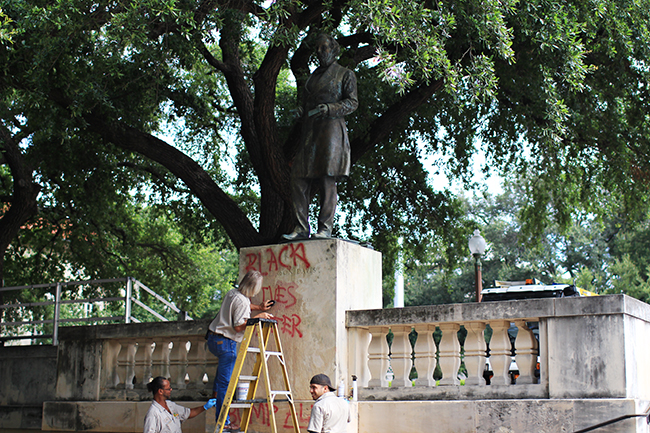Early in the morning of June 23, three statues of confederate leaders at the University of Texas at Austin were vandalized with spray paint, each bearing the message “Black Lives Matter.” The messages have been removed, but the perpetrators were not caught.
This Editorial Board cannot condone such radical behaviors. We wholeheartedly support, as we have for months, removal of the statues from their entirely inappropriate position on this campus. But, the means of achieving that end must not include illegal actions. Such behaviors delegitimize the student voice and impede our collective ability to enact change on this issue and others in the future.
The question of how to treat abrasive artifacts of one of the most shameful periods in American history has been in the national spotlight recently following the appalling shooting of the African Methodist Episcopal Church in Charleston, South Carolina. UT has not been exempt from this issue, as the relocation or removal of various vestiges of the Confederacy has simmered for months. Student Government, headed by President Xavier Rotnofsky, has been especially diligent about such efforts, with the passage of a resolution to remove the Jefferson Davis statue within Rotnofsky’s first weeks in office.
Given the longstanding national and university-wide debate, the issue is now ripe for new UT President Gregory Fenves. Today, he announced the formation of a committee that will confront the issue and suggest several possible courses of action by the end of the summer. It is notable, however, that the ultimate control of the issue lies with Fenves and will not require the Board of Regents’ approval, according to a UT press release.
Despite the prompt removal of the vandalism and formation of a committee, this Board still has serious reservations about the way Fenves has handled this issue. Fenves has known of student support for the removal of confederate statues for quite some time: the SG resolution was even passed before Fenves was named the sole finalist for the UT presidency in March.
We understand that such major decisions must be measured, especially given Fenves’s recent entry to office and the explosive nature of this issue in our state, region and country. But, there are times when steadiness must be checked in favor of acting for the sake of what is right and in partnership with the wishes of the student body. We strongly feel that a monthslong delay of action will injure this cause and reflect poorly on Fenves and this University.
















